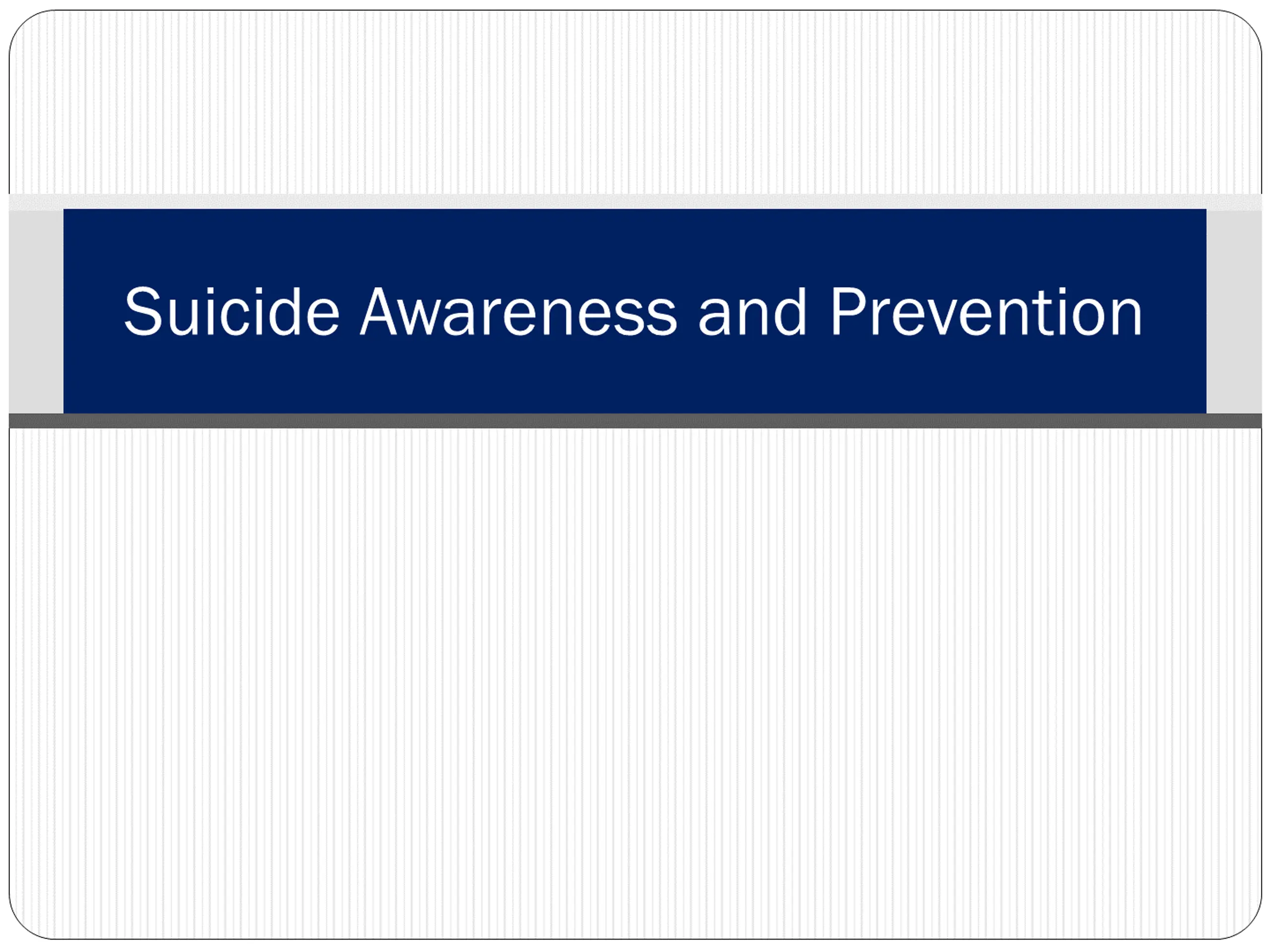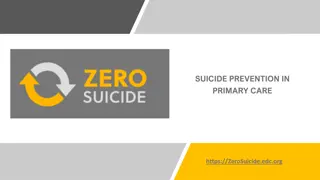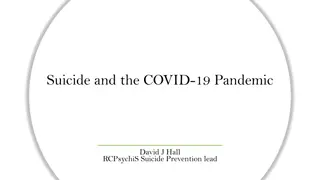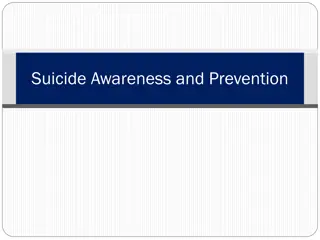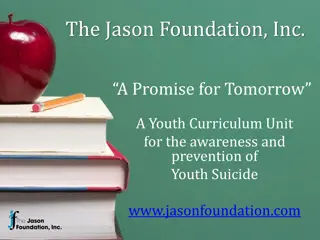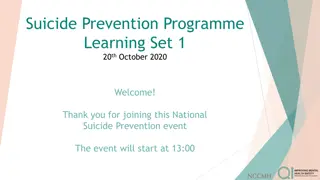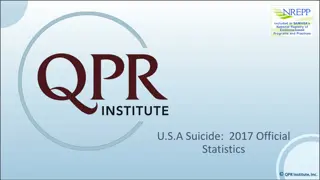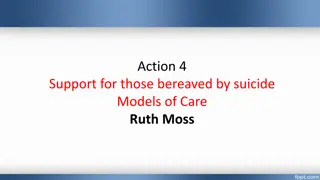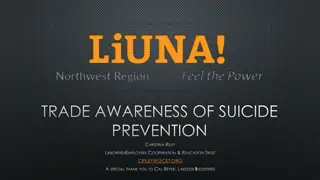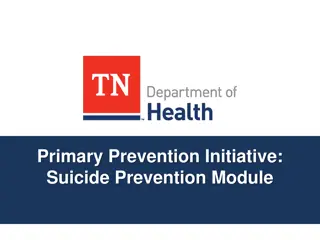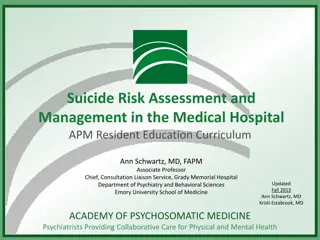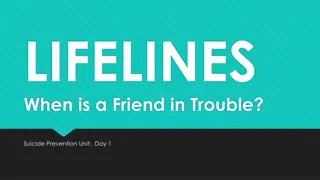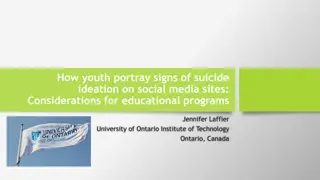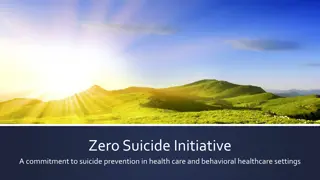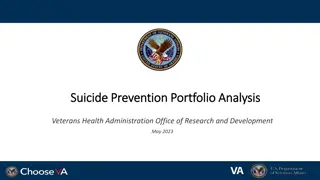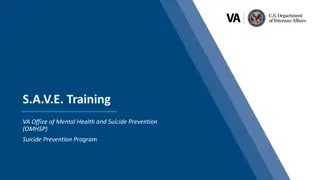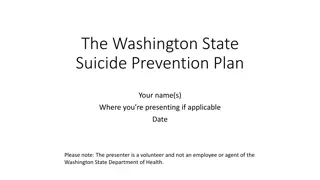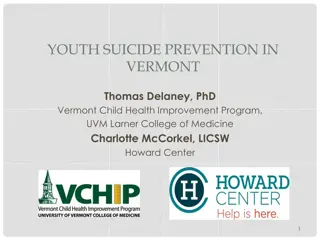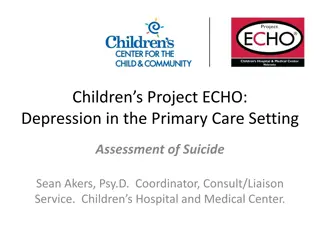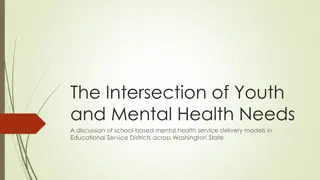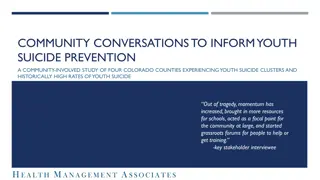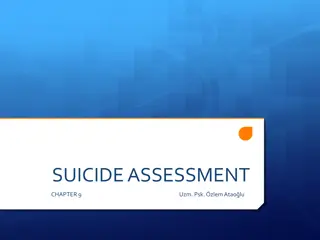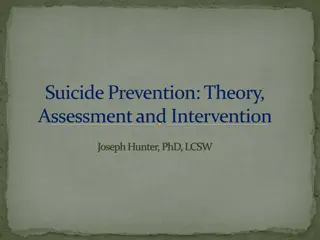Suicide Awareness and Prevention
Suicide, suicide attempts, risk factors, protective factors, and how to effectively intervene in order to prevent loss of life to suicide.
Download Presentation

Please find below an Image/Link to download the presentation.
The content on the website is provided AS IS for your information and personal use only. It may not be sold, licensed, or shared on other websites without obtaining consent from the author.If you encounter any issues during the download, it is possible that the publisher has removed the file from their server.
You are allowed to download the files provided on this website for personal or commercial use, subject to the condition that they are used lawfully. All files are the property of their respective owners.
The content on the website is provided AS IS for your information and personal use only. It may not be sold, licensed, or shared on other websites without obtaining consent from the author.
E N D
Presentation Transcript
Learning Topics Suicide and suicide attempt Suicide gesture and behavior Key risk factors Protective factors First responder Ask Care Treat MAD Suicide resources Hotline
Importance Loss of life to suicide is of great concern within the Department of the Navy (DON). The goal of the Navy s suicide prevention program is to help you recognize and understand suicide risk, protective factors, and how to help and effectively intervene.
Suicide and Suicide Attempt Suicide: an intentional act resulting in one s own death. Suicide attempt: an intentional act, causing self-harm, where death would have occurred without direct intervention.
Suicide Gesture and Behaviors Suicide Gesture: similar to a suicide attempt except there is NO attempt to kill ones self. Suicide behaviors encompass a broad range of acts, including suicide attempts, gestures, threats, and suicidal thoughts.
Key Risk Factors Four key risk factors increase the likelihood for suicide: 1.Mental health problems, such as depression 2.Substance abuse or increased alcohol use 3.Situations that a Sailor labels as hopeless 4.Suicide behaviors, such as: Previous suicide attempts or suicide gestures Hints or talk about suicide
Protective Factors One strategy to prevent suicide is to reduce risk factors or strengthen and increase protective factors, such as: Belief that it is OK to get help Early intervention by the command Good problem-solving and coping skills Optimistic outlook Positive attitude about getting help early Positive family and social support Spiritual support
First Responder To be a First Responder, you must: Know the warning signs of suicide Let your shipmate, friend, or family member know that you are worried, concerned, and care about him/her Take all talk about suicide very seriously As a First Responder, you can follow the acronym ACT: Ask Care Treat
ASK DO: Ask your shipmate if he/she is thinking about suicide Actively listen to what he/she has to say Acknowledge his/her talk, behavior, and feelings DON T: Debate whether suicide is right or wrong Discuss whether feelings are good or bad Lecture the person on the value of life
CARE DO: Let your shipmate know you care and understand Discuss and care about what is troubling him/her Maintain good eye contact and give your undivided attention Care if a shipmate has a plan for suicide DON T: Encourage him or her to do it Act shocked this will put distance between you
TREAT DO: Obtain professional help as soon as possible DON T: Leave the person alone Be sworn to secrecy
Dont Get Mad DON'T: Miss or mistake signals Avoid the person Disregard signals
Suicide Resources Chaplains Command leadership Fleet and family support centers Marriage and family counselors Medical services University resources
Hotline Insert Campus Hotline Here
Resources American Association of Suicidology http://www.suicidology.org Centers for Disease Control and Prevention http://www.cdc.gov/ViolencePrevention/suicide/ Navy and Marine Corps Public Health Center http://www.nmcphc.med.navy.mil/ Navy Suicide Prevention Program http://www.public.navy.mil/bupers- ncp/support/suicide_prevention/Pages/default.aspx Mental Health https://www.militarymentalhealth.org/welcome.asp Military OneSource : www.miltaryonesource.mil National Suicide Prevention Lifeline http://www.suicidepreventionlifeline.org/ OPNAVINST 1720.4A
